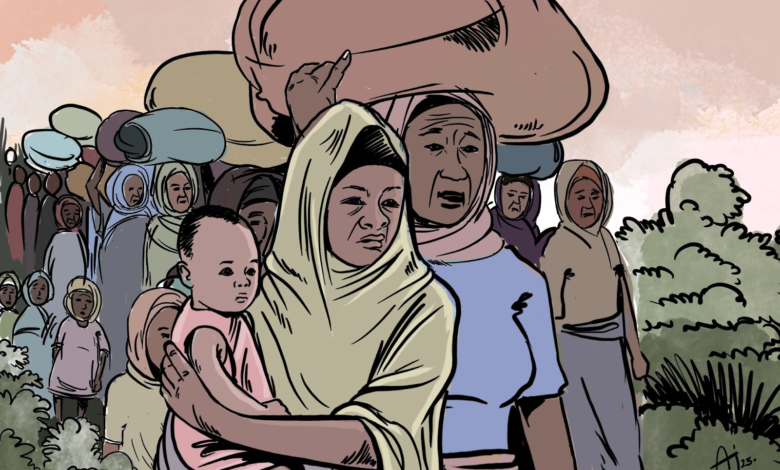Thousands Of Nigerians Seek Refuge In War-Torn Cameroon Community
Thousands of Nigerians fleeing recent violence between farmers and herders in Benue state have turned up in a village in Southwest Cameroon, outnumbering its residents. They are already suffering under their own seven-year conflict.

The leader of a community in Cameroon has described the difficulty his tiny village is having hosting thousands of refugees fleeing violence between farmers and herders in Nigeria.
In May, more than 7800 Nigerians turned up in Southwest province, outnumbering the residents of a tiny community just over the border with Cameroon, already suffering under a seven-year separatist conflict.
“There was no time that you could have a successful meal without seeing more than 500 people in front of you,” said Chief Agwa Linus, chief of Bakinjaw.
Aid sent to the village by the Nigerian government was welcome, the chief said, but they will soon need more.
The Nigerians fled their home in Benue state following three separate clashes between farmers and graziers in May in which over 30 people were killed.
Bakinjaw, a village in one of Cameroon’s insecure regions itself, is a small community of some 5000 people. It is already affected by conflict with Anglophone separatist terrorists, who have attacked the village in the past.
Challenging
Chief Linus was talking to the media in Buea, receiving some refugee aid from the Nigerian High Commissioner to the Northwest and Southwest of Cameroon, H.E Lawal Bappah.
He said it was the most challenging period he had ever witnessed after nine years in his seat.
“It is quite challenging to host a community that overwhelms my community. The population of Bakinjaw is not up to 6000. Then suddenly you wake up and see more than 7000 people who are coming over when we never had any refugee camp to host them,” he revealed.
“So when I got on the ground, it was quite an emotional moment for me.”
The representative of the Nigerian government said disputes between farmers and grazers were recurrent in the area.
“From time to time, when there are issues like that, Nigerians run away from their town and come to Bakinjaw and settle there. Sometimes Cameroonians also go across when it’s hot over here. It’s something that may not cease forever, but at least with these relief materials, it will go a long way to make their stay a little bit more comfortable for a while,” said the High Commissioner.
The aid included 100,000kgs of rice, sacks of beans, clothing and bedding, mosquito nets, drugs and eating utensils.
Separatist terror
There is a conflict going on in the area of Cameroon to which the Nigerians have fled.
Bakinjaw is situated in Akwaya subdivision, an area where separatists have declared ownership and launched several attacks. Cameroon separatists want independence over the two English Speaking regions of the country.
Hundreds of thousands of Cameroonians have been displaced by the conflict.
Last year over 35 people were killed, including six Nigerians, during an attack at a funeral in Bakinjaw. Cameroon’s government blamed the attack on separatist terrorists.
The Nigerian High Commissioner said he was praying normalcy can return in Benue so Nigerians can return to their respective villages. He urged them to live in peace with their host community, law-abiding and not to meddle in the internal affairs of Cameroon.
Villagers say their relationship with Nigerians is cordial, as only a river separates them. They speak the same language, bear the same names, and their communities often intermarry.
Support Our Journalism
There are millions of ordinary people affected by conflict in Africa whose stories are missing in the mainstream media. HumAngle is determined to tell those challenging and under-reported stories, hoping that the people impacted by these conflicts will find the safety and security they deserve.
To ensure that we continue to provide public service coverage, we have a small favour to ask you. We want you to be part of our journalistic endeavour by contributing a token to us.
Your donation will further promote a robust, free, and independent media.
Donate HereStay Closer To The Stories That Matter




